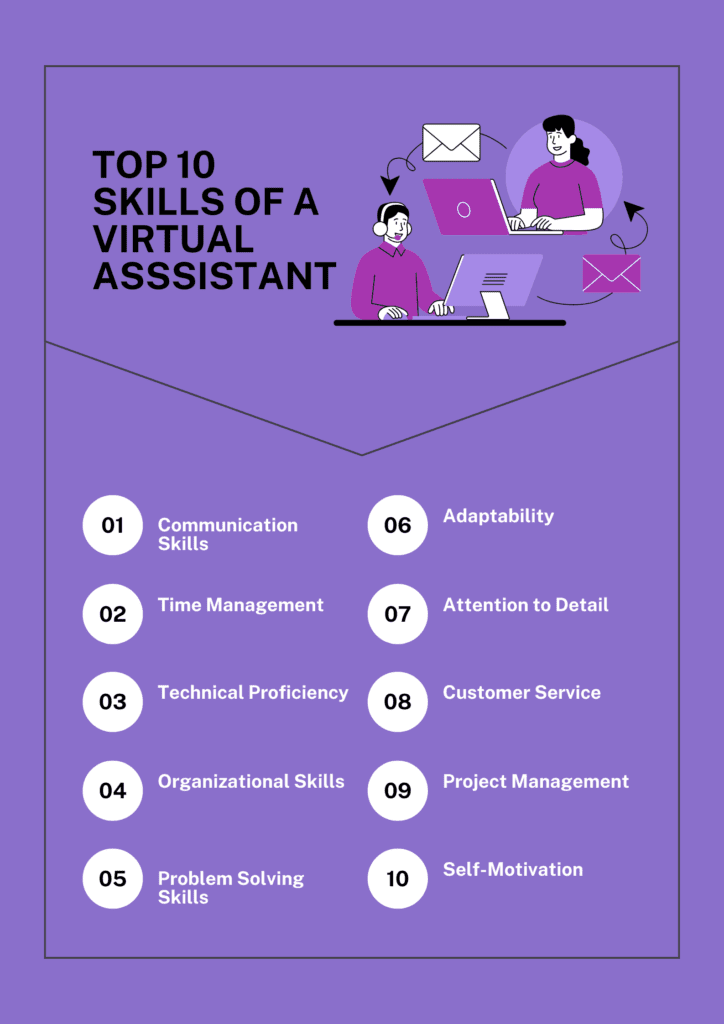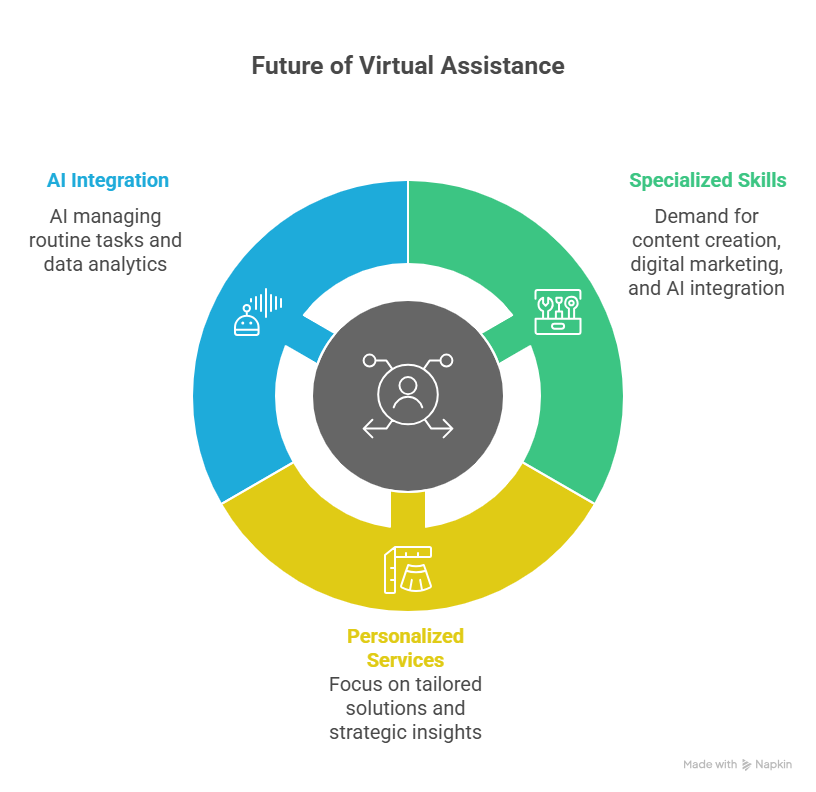Top 10 Virtual Assistant Skills: Growing Roles and Abilities for Success
19 Aug 2024 By: Mary Dellosa
Updated

Work keeps changing, and so are the skills that make virtual assistants great at what they do. Whether you’re new to the field or looking to improve, understanding virtual assistant skills is the key to growing and staying relevant.
Let’s break down what a virtual assistant (VA) does, what skills are needed to be a virtual assistant, and how you can keep up in this fast-changing industry.
What is a Virtual Assistant?
A virtual assistant provides remote support to businesses, handling everything from emails and scheduling to marketing and bookkeeping. They work online, which means they can help clients anywhere in the world.
Most people think VAs just do admin work, but that’s not true anymore. The general virtual assistant skills you see today include:
- Content writing
- Project management
- Social media strategy
- Technical support
As businesses grow more digital, the demand for skilled VAs keeps climbing.
Virtual assistance has been around for decades, but it’s exploded with the rise of remote work and better tools. Now entrepreneurs can easily hire someone from across the globe who’s capable, dependable, and highly skilled.
The Expanding Roles of Virtual Assistants
Administrative Tasks
This is where most people start. Tasks like data entry, calendar management, or organizing documents are still part of the virtual assistant skill list, but today’s VAs go beyond that. A strong VA finds ways to make their client’s day easier. This is by improving workflows, setting up automation, or spotting areas that can be simplified.
If you want to learn how to be an effective virtual assistant, start here. Understand your client’s needs before they even ask.
Social Media Management
Social media is now a huge part of a VA’s job. From writing captions to analyzing engagement reports, a VA often becomes the voice of a brand online. This is one of the skills needed to be a virtual assistant in 2025 and beyond.
A great social media VA understands trends, plans ahead, and helps the business connect with real people. That combination of strategy and creativity makes them invaluable.
E-commerce Support
E-commerce businesses rely heavily on ecommerce virtual assistant skills. These include product listing, inventory management, ecommerce inventory forecasting, order tracking, and responding to customer inquiries.
An e-commerce VA needs to know platforms like Shopify, WooCommerce, or Amazon Seller Central. They help online stores run smoothly so business owners can focus on growing sales instead of handling every small task.
Customer Service and Support
Customer satisfaction is everything. Virtual assistants who handle live chat, phone, or email support are often the first point of contact for customers.
When done right, this job builds trust. It also helps clients save time and retain customers. Whether working in retail, tech, or healthcare, good communication and empathy are key virtual assistant skills every VA should have.
Medical and Healthcare Support
There’s growing demand for medical virtual assistant skills too. These VAs help healthcare professionals manage appointments, update patient records, and process insurance claims.
It’s a role that requires precision and confidentiality. A medical virtual assistant must understand HIPAA compliance and use secure systems to protect patient information. The work is meaningful. It helps doctors focus on care while VAs handle the paperwork.
Essential Virtual Assistant Skills for Success

Communication Skills of a Virtual Assistant
Clear, polite, and professional communication tops any virtual assistant skill list. Whether you’re emailing a client or replying to customers, the ability to express ideas clearly makes everything easier.
The best VAs don’t just follow instructions. They listen, ask questions, and adapt their tone depending on who they’re talking to.
Time Management Abilities
Juggling multiple clients or projects requires strong time management. This is one of the most critical skills needed to be a virtual assistant because deadlines and schedules define your reliability.
Successful VAs plan their day, prioritize, and stay organized. They don’t wait to be told what’s next, they make things happen.
Technical Proficiency
Every VA works online, so being tech-savvy is essential. Know how to use tools like Slack, Trello, Notion, Zoom, and CRM systems. The more comfortable you are with technology, the smoother your workflow.
To stay competitive, keep updating your general virtual assistant skills through online learning. The more tools you master, the more opportunities you’ll attract.
Organizational Skills
Staying organized is a quiet superpower. It’s what keeps everything from collapsing when tasks pile up. A good VA can manage calendars, files, and emails with ease, making sure nothing slips through the cracks.
Problem-Solving Abilities
Every day brings something new. A missing file, a tech issue, or a client who suddenly changes direction. Great VAs stay calm and figure things out. Problem-solving is one of those virtual assistant skills that clients immediately notice and value.
Adaptability
I have prove and tested that being flexible is what separates good VAs from great ones. The ability to learn quickly, switch tasks, and work with different types of clients is crucial. Whether you’re mastering ecommerce virtual assistant skills or learning about a new CRM tool, adaptability keeps you valuable.
In an ever changing work environment, their ability to remain flexible ensures they can meet diverse demands and handle unexpected changes effectively. Sometimes this flexibility is tested through unusual requests like helping a client convert a fraction to percent for a report or
Attention to Detail
Small mistakes can cost big time. That’s why detail-oriented VAs are worth their weight in gold. From scheduling to data entry, accuracy builds client trust and long-term relationships.
Customer Service
Even if your main role isn’t support, good customer service matters. Clients appreciate VAs who treat their business as their own, handling inquiries or feedback with care and professionalism.
Project Management
As you gain experience, you might start leading projects. You’ll coordinate people, track progress, and keep everything moving forward. This is another step toward learning how to be an effective virtual assistant who adds real value to a business.
Self-Motivation
Working remotely means no one is watching you. That’s why self-discipline is one of the most important skills needed to be a virtual assistant. The best VAs manage their time, deliver high-quality work, and stay accountable without supervision.
Real World Example
In a recent case study, HelpSquad BPO partnered with Connexa Sports Technologies and its consumer brand Slinger Bag to significantly improve its customer experience. Within the first month, response times for over 1,100 customer tickets dropped by around 90 % and customer satisfaction rose by more than 12 %. By tapping into top-tier virtual assistant teams with the right skills needed to be a virtual assistant, the client was able to scale support, improve engagement, and deliver real value at a critical stage of growth.
The Future of Virtual Assistance
Predicted Trends in Virtual Assistance
The VA industry is growing fast. Businesses want VAs who can do more than administrative work. They want thinkers, strategists, and problem-solvers. Those who continue learning and improving their virtual assistant skills will always have an edge.
If you’re wondering how to be an effective virtual assistant, focus on continuous learning and curiosity. These two habits can take you from a basic VA to a long-term partner for your clients.

How AI is Influencing Virtual Assistance
AI tools are now part of everyday work. They help VAs automate repetitive tasks and analyze data, leaving more room for strategic and creative work.
For example, someone with strong medical virtual assistant skills can use AI to help doctors manage records faster while still ensuring data privacy. In e-commerce, a VA can use automation to track orders or send customer follow-ups more efficiently.
AI isn’t replacing virtual assistants, it’s helping them work smarter.
Trending Now
In 2025, the virtual assistant skill list keeps expanding. Businesses now look for professionals with digital marketing experience, data analysis, and basic AI literacy.
Based on my observation, top performers combine ecommerce virtual assistant skills and customer service expertise with adaptability and a willingness to learn. Add strong communication and you have a formula for success in almost any industry.
How to Adapt to the Changing Landscape of Virtual Assistance
Continuous Learning and Skill Development
Virtual assistance is one of those careers where learning never ends. The more you know, the more valuable you become. Take short courses, watch tutorials, and stay up to date with new trends. VAs supporting online course creators can use platforms like Coursiv to manage student enrollment, course delivery, and engagement tracking across multiple programs.
If you’re serious about growth, make learning part of your daily routine. That’s the foundation of how to be an effective virtual assistant.
Embracing Technological Advancements
Technology changes fast. VAs who stay updated with new tools or AI-powered platforms can work faster and smarter. This doesn’t just improve your productivity, it gives your clients better results.
Cultivating a Flexible and Adaptable Mindset
No two clients are the same. Some need medical virtual assistant skills, others want someone who can handle e-commerce or digital marketing. The ability to adjust to different industries makes you more competitive and in-demand.
Flexibility and a positive attitude go a long way in this business.
FAQs: Virtual Assistant Skills
Conclusion
The world of virtual assistance is full of opportunity. With the right virtual assistant skills, you can work with clients anywhere, in any industry, and build a rewarding career on your terms.
If you’re ready to scale your business with professional, trained VAs, HelpSquad BPO can help. Our bilingual agents are skilled in customer service, back-office support, and research. Available 24/7. Talk to us today.


